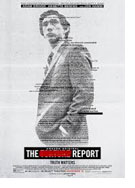

Opening 7 Nov 2019
Directed by:
Scott Z. Burns
Writing credits:
Scott Z. Burns
Principal actors:
Adam Driver, Annette Bening, Jon Hamm, Corey Stoll, Linda Powell
Caught off-guard by the terrorist attacks on 9/11, the CIA struggles to gain intelligence that will prevent further attacks. In this quest, the CIA subverts U.S. and international law prohibiting torture and turns to Enhanced Interrogation Techniques championed by two pseudo-psychologists, Jim Mitchell (Douglas Hodge) and Bruce Jessen (T. Ryder Smith) and embarks on a clandestine mission of torturing suspects, whose intelligence value is dubious. The movie follows the investigation of Daniel Jones (Adam Driver) who is tasked by the Senate Intelligence Committee via Dianne Feinstein (Annette Benning) to investigate the use of torture by the CIA.
Instead of portraying the events chronologically, the film jumps back and forth through time, mirroring the process an investigation would take as it uncovers information. The desperation of the CIA, the explanation of the interrogation techniques, the twisted legal interpretations employed by the Bush administration to justify use of the techniques, the over-ridden objections by some in the intelligence community, and the attempts to derail the investigation are all deftly portrayed in the film. Somewhat reminiscent of other investigations into government corruptions and cover-ups, i.e., All the President’s Men, it differs in that those were journalistic investigations, while this one was a government investigation. Journalism provides full public disclosure while this one fell victim to political stone-walling by the Obama administration to prevent release of the full report. Sadly, also unlike All the President’s Men, the perpetrators are never held accountable for their actions. Indeed, the only person expressing any true outrage is Daniel Jones.
While the subject of the film is not new, the manner in which these decisions were made and the brutal depictions of the torture techniques used should lead us all to think about what humanity is. While certainly examples of horrific cruelty exist throughout time, what makes people engage in this behavior, and if not actively engage in it, condone and tolerate it? How can this be justified? And what role should the government take when it does happen? The U.S. is quite adept at exposing human rights violations of other governments, but isn’t so keen on exposing its own. These questions and more occur, but the strength of the film may be that it presents the situation in a fairly objective manner, leaving the viewer to judge who is to blame. (Anne Crocker)